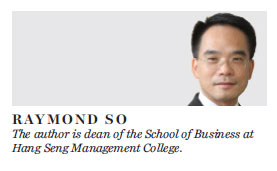Youth unrest is not a problem that is exclusive to the SAR
Updated: 2016-04-14 08:12
By Raymond So(HK Edition)
|
|||||||||
Some young people in Hong Kong feel a lot of dissatisfaction with the status quo, as evidenced by an increasing number of incidents of our youth resorting to bad language, aggressive behavior and even violence. For them, the belief in doing things in a "peaceful, rational and non-violent" way is outdated. They thus easily resort to violent acts. In fact, such a phenomenon is not unique to Hong Kong. A similar situation exists in Japan; young people there seem to be more dissatisfied with society, but they have generally not resorted to violent behavior.
A survey conducted by Asahi Shimbun from February to April, which interviewed 3,000 young people aged between 18 and 19, revealed striking results. More than half of the respondents believe there is social injustice in Japan. Also, more than half believe that the gap between rich and poor is too large. The most disturbing revelation is that more than 50 percent of the respondents believe that young people's efforts won't be rewarded, no matter how hard they work. Another alarming finding is that more than 80 percent of the respondents do not trust Japanese politicians. They believe politicians do not care about young people.
I believe many Hong Kong youth hold similar views. Both Japan and Hong Kong have developed in similar ways economically and socially. So it is not surprising to see similar social problems occurring in both places. When I read this Japanese data, I naturally associated it with the plight of young people in Hong Kong. I believe the Japanese experience is relevant to the situation in Hong Kong.
First, young people in both places are concerned about social inequality, particularly dissatisfaction with wealth distribution. Hong Kong and Japan have focused on developing their economies since World War II. Thanks to the hard work of the older generations and to economic booms, there were periods of high economic growth. However, these days have gone. The baby boomers born after World War II accumulated wealth through hard work. However, some young people believe the same formula no longer works for them. They believe the resources and opportunities in society are now concentrated in the hands of a small number of people. They feel that the unfair distribution of wealth and social inequality are increasing.
In Hong Kong, the high land price policy since colonial times has resulted in some deep-seated problems; it is not easy to change the old system without hurting established interests. Those who have accumulated assets have become richer and richer. But those who have no assets cannot enjoy the benefits of economic development and cannot catch up with those who have. The complex problem of social and wealth inequality has emerged to the dismay of young people. This can lead to social instability. It therefore should be handled with care.
Second, many young people now feel that their efforts will not be rewarded. Many say that even if they work hard, they will not be rewarded. This is very worrying if it is truly what they think. Older people repeatedly remind young people to study and work hard to prepare for a better life. This advice is sensible. In the past, society was poor and getting a job was not easy, but if one could seize an opportunity and do the right things, the chances of achieving success were great. Now that society has developed to a level of maturity with an expanded economic base, rapid growth will not happen again without fundamental changes. It is natural for young people to voice their discontent at this lack of opportunities. Japan's economy has been lackluster for two decades. Starting salaries for young people have not seen much growth in the past two decades. Fortunately living costs and prices in Japan have not increased significantly because of the economic downturn and deflation during the period. Meanwhile, in Hong Kong over the past 10 years entry salaries for young people have remained essentially unchanged, but living costs and prices have been rising. If we put ourselves in their shoes, we could feel the same sense of frustration. When older people talk about the "Lion Rock Spirit", many young people simply won't listen - to say nothing of sharing such a belief. This is a real concern. Hong Kong must find ways to "jump-start" the economy so we can create new opportunities for the next generation. This is something we cannot afford to delay any longer.
The success or failure of the Japanese government's measures in handling problems facing young people can also provide useful lessons to Hong Kong.

(HK Edition 04/14/2016 page10)